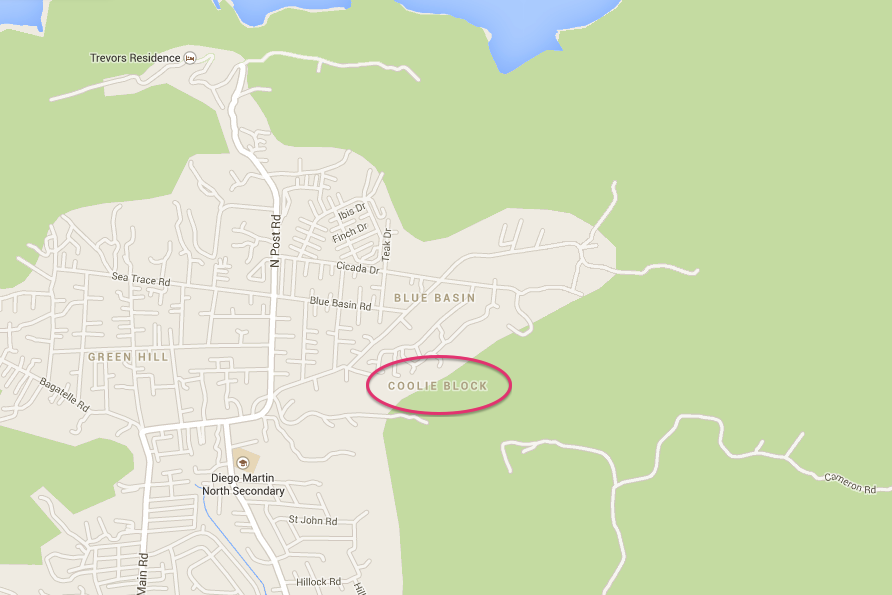
Fuldya wasn't on Google Maps, but that wasn't proof it didn't exist, says Global Voices. The service makes mistakes: like “Coolie Block”, the area circled on this Google map of Trinidad and Tobago that nobody in the country has ever heard of.
According to its profile on the Global Voices web site, the nation of Fuldya, like so many other countries, struggled to keep its economy afloat, its politicians honest, its press free, the rights of its people unviolated, its environment unsullied. Fuldya, in fact, sounded like a reporter's dream beat—if only it actually existed. For six years, however, Global Voices reported vividly on events in Fuldya, a situation Executive Director Ivan Sigal calls “beyond embarrassing.”
The error came to light after Global Voices was sued by the parents of a 14-year-old student from Pennsylvania, who was rejected as a delegate to the US National Model United Nations [1] after he applied as a representative of Fuldya.
“Global Voices has destroyed our son's future,” the student's father said when contacted by phone. “He had a perfect Grade Point Average before he encountered their nefarious web site with its fake countries and who knows what other kinds of false information it's peddling. Now all he does is smoke pot, and Global Voices is responsible.”
How did a reputable international citizen media network like Global Voices come to report on a fake country?
Managing Editor Solana Larsen recalls that in 2008, she received an e-mail from someone called Jóquesonyou Yomàma, volunteering to cover the Fuldyan blogosphere. She admits she never checked to see whether Fuldya actually existed. “I'd never heard of it before, but it's not like I'm a geography expert. I assumed it was just some place that didn't get much international news coverage, like many of the smaller countries Global Voices covers. Who are we to tell somebody they come from a country that doesn't exist?”
Larsen adds that since the discovery of Fuldya, she makes sure to read the name of every new applicant out loud to a colleague as part of the vetting process.
Managing Director Georgia Popplewell says she once did a search for Fuldya on Google Maps, but didn't worry too much when she couldn't find it. “Google Maps is rife with mistakes and omissions,” says Popplewell. “On the Google Map of my own country [Trinidad and Tobago] there's an area prominently labelled as “Coolie Block” that nobody I know has ever heard of.”
Things might have turned out differently if “Jóquesonyou Yomàma” wasn't a fine writer who quickly became one of the site's most prolific and popular contributors. Yomàma regularly turned out four to five articles per week on Fuldya, building a riveting narrative of a small nation grappling with corruption, crime, gender inequality and government censorship, against the backdrop of a thriving tech innovation landscape and a cultural scene that included a flourishing young film industry nicknamed “Fuldywood”. According to Deputy Editor Sahar Habib Ghazi, Global Voices’ Fuldya posts figured consistently among the site's biggest drivers of traffic, often ahead of articles with “sex” in the title.
“I think that in some ways we fell in love with Fuldya, and so did our readers,” says Habib Ghazi. “We cheered when Fuldya's evil dictator, Navi Lagis, was overthrown by a popular uprising. When right-wing rebels in the north of the country captured a child activist, we lobbied—successfully, we believed—for her release. We even spearheaded a fundraising drive for victims of the Fuldyan tsunami of 2010. Who knows where that money went?”
In addition to being the source of many articles, Fuldya was the prototypical emerging nation. “In retrospect, perhaps too prototypical,” says Solana Larsen. “It was just all a little too neat. How could so many things happen in one small country? But every time I looked at our traffic stats those doubts and questions evaporated into thin air.”
Perhaps the more important question to ask would relate to the glaring factual inconsistencies discovered across articles on Fuldya by the committee set up, post-discovery, to audit the site's content. How, for instance, does one square an article headlined “Oil Spills Matter, Even in Landlocked Fuldya”, with one about a corruption scandal involving beachfront development in the south of the country? And what about that tsunami? And how come Global Voices covered two Fuldyan democratic elections before the overthrow of the evil dictator Navi Lagis?
And who was Jóquesonyou Yomàma? Global Voices contributor Billery Eddle, who was assigned Yomàma as a roommate at the 2010 Global Voices Summit in Chile, recalls that “Jóquesonyou and I talked long into the night, discussing politics and drinking Fuldyan vodka—or maybe it was wine.” Yomàma, however, does not appear in a single photo from either event, and Eddle cannot recall what she—or he—looks like, nor can she find the “I Heart Fuldya” t-shirt Yomàma brought her as a present.
Global Voices’ Fuldya coverage was pulled from the site pending the outcome of the lawsuit brought by the 14-year-old student's parents. Executive Director Ivan Sigal, however, says they have all intention of restoring the content once Global Voices has been cleared of responsibility for the US teen's pot-smoking habit.
“We're not going to be held ransom by some little stoner who's stupid enough to base his Model UN application on a country that was mentioned on only one web site on the entire Internet,” says Sigal, who asked not to be quoted as saying that.
“Fuldya was the best thing that ever happened to Global Voices,” adds Sigal. “Traffic to the site has now plummeted to one-third of what it was when we had Fuldya. Maybe we should have done our homework better, but our mission is to cover underrepresented stories, and even though Fuldya isn't real, in a sense that makes it more underrepresented than ever.”
Happy April Fool's Day!